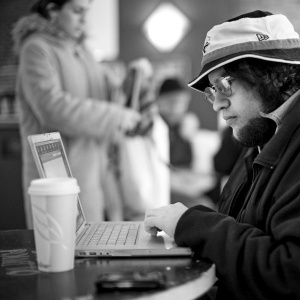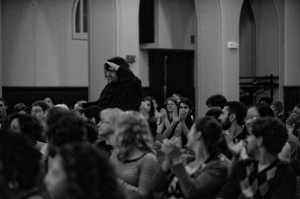New Composer Rises Above the Confines of Music Genre
We have been following Margaret Stewart Lindsay Arts Leadership Award recipients Michael Reichman and Brian Kaufman for quite some time now on their emerging concert series, Musical Diplomacy. Their most recent event was this May at the Fenway Center, and was titled A Concert and Discussion on Race and Culture in the Age of Obama. Our blog has included a feature on the program (as written by Brian and Michael), an interview with the two, and a feature on composer Daniel Bernard Roumain, whose participation in the event provided both musical and inspirational energy. His composition, Symphony for the Dance Floor, was the electric finale of the May 14th performance.
We would now like to take this opportunity to introduce to another composer who was involved with Musical Diplomacy: Jason Belcher. Jason recently received his Bachelor’s of Music from New England Conservatory (NEC) in Contemporary Improvisation and Jazz Studies, and will be returning in the Fall to purse his Masters in Composition. We sat down with Jason to discuss his involvement with the event and his perspective on diplomacy in music:
 When/how did you first learn about Musical Diplomacy (MD)?
When/how did you first learn about Musical Diplomacy (MD)?
I first learned about MD soon after Derek David and Albert Oppenheimer were finishing their pieces for the first MD event last year. I hadn’t known Brian and Michael too well then, but loved that they put the event together. It was a presentation built around current events, new music, and bringing a lot of minds together, and that’s a great thing.
Why did you want to be involved? How does this project connect to your own mission as an artist?
When they asked me to write a piece last year (around this time), I knew that I wanted to contribute to their next production right away. I knew that I could also get folks from the Jazz and Contemporary Improvisation departments involved (which fit the subject perfectly).
My mission was (and is) to bring together people from all kinds of musical paths and backgrounds to contribute to a greater whole. I feel that this is relative to American history, our advancements as a country, and also the advancements of NEC as a musical institution. I feel like there’s a lot of research going on here in terms of the way various people (students, faculty, and staff alike) are working, and the ways that we can work together. Just when I feel I’ve figured something out, a new bunch of people come along, give me a new set of tools, and the things we come up with are always rising to a new level.
How did your piece connect to the overall mission of Musical Diplomacy? What was your hope for the evening in terms of what the audience took away from the experience?
Race and Culture in the Age of Obama: One of the first things I did when I knew I’d be writing this piece was to go on the web, and look up interviews with our President. One of them was a short clip called “Jazz in the White House.” We see Obama say something like “We are going to have Science in the White House…Jazz in the White House.”
In the video the music that those kids are shown playing is closely related to other urban styles of music. It was a great example of an integration of people and cultures, and I knew I had to do something to contribute to M.D that dealt with music in that way.
Do you think the event as a whole was successful?
Yes. The musical program covered so many bases all relating to the subject. I really loved the program, and am happy to have had a premiere alongside Caroline and Daniel.
Brian and Michael also found a way to acknowledge the theatrical side of things by linking performances with recordings that we had made of ourselves, or others. I wasn’t too sure about that at first (I hate hearing my own recorded voice) but it really worked.
What are your thoughts on the discussion/panel component, including the pre-concert discussion at NEC – how did this contribute to the experience for you as a participant? For the audience?
The panelists at the concert, and their stories were wonderful. However, I preferred last year’s panel discussion over this one for a couple reasons. Last year, there was some opposition and differing views from within the panel. Everyone on this year’s panel had different experiences, but they all seemed to agree with each other. Also, there was much more conversation between the panelists last year. I was not terribly disappointed, but those are some things that I thought the panel could have been further strengthened by.
I enjoyed the diversity of the panel at NEC, and the wide range of sub-topics they covered when dealing with race. Here is another example of inter-departmental work that is fantastic, and needs to continue in other ways.
Did this inspire you to think about your work or role as an artist differently or inspire any new ideas?
It was incredible to hear my work being played by a large group of people. I personally don’t like a lot of political things associated with orchestras – it’s kind of like sports teams with coaches (or in this case, conductors) and players that are over-payed, and talked about way too much. However, I think that this is a vehicle that I can work with a little better in the future, by developing an individual way of writing for the orchestra, as many others have. If you look at every century, the orchestra has changed, and I don’t think that the 21st is an exception. The American Composer’s Orchestra, their commissions, and ideas were an inspiration to me while I was writing this work.
As far as the event itself goes, the diversity of the music, everyone involved in the production, and everyone in the audience made me very excited. It makes me proud to be where I am. It says “Look at all we have to work with here.”
I understand that you’ve started a community music series, can you tell us more about that? (what, why, who, how)
Here at NEC, we have a variety of programs that are known for being some of the best in the country. However, what you don’t hear is that those programs can (and sometimes do) collaborate. We’re all in the same boat, but largely in different quarters as far as the administration is concerned.
Because of the logistics involved, it’s hard for the school to organize inter-departmental forums and activities, but I wanted to find students, faculty, and alums who are interested doing cross-departmental work. I did a lot of talking to different people, had a few open reading sessions (of work suited to any musician/instrument etc.), and now there’s a core of about 30-40 people who have been involved in an off-campus series.
Next year, I’d like to begin working with students from other schools, and produce an interdisciplinary series. In the next few weeks, I’m planning to meet with students from Longy, Mass Art, Harvard, and Tufts. I’ve had a lot of help from other students in getting ideas and organizing for the series, and we’ve agreed that this is the next best step.
This article is a continuation of our Musical Diplomacy series. Stay tuned for our final interview with Michael and Brian to see their perspective on the event’s success!





